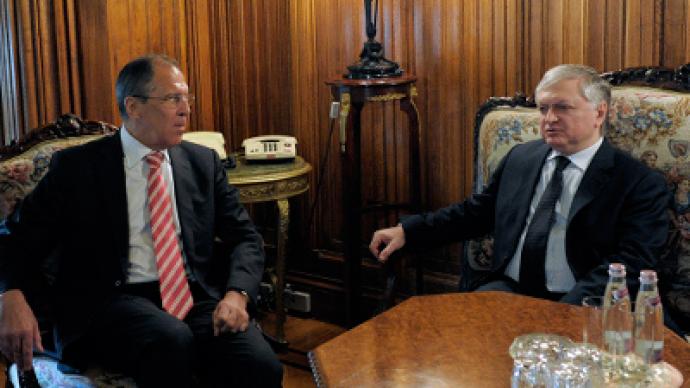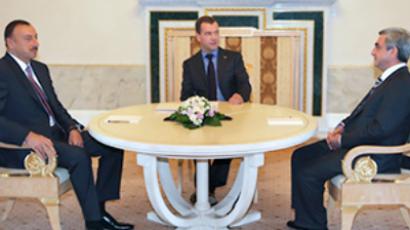Russia against changes in Nagorno-Karabakh mediation format

Attempts to change the format for mediating the Nagorno-Karabakh territorial dispute at this critical juncture when a resolution must be reached are counter-productive, Russia’s Foreign Minister Sergey Lavrov has said.
Moscow believes that at the present stage, it would not be reasonable to replace the OSCE Minsk Group – which has thus far attempted to negotiate a peaceful resolution to the conflict between Armenia and Azerbaijan over Nagorno-Karabakh – with any other structure. The group, which is co-chaired by Russia, the US, and France, also includes several other states as well as the parties to the conflict –the two former Soviet republics."Essentially, we have reached the point where decisions must be made. I do not think that conversations, especially at this decisive stage, about changing the mediation format, will be productive," Lavrov told a media conference after a meeting with his Armenian counterpart Edward Nalbandian in Moscow, cites Interfax agency.According to the Russian minister, “such talks only create the illusion that if the format is changed, the content will sort itself out”. He pointed out that talks of changing the nature of the format normally “divert attention from the substance”. Lavrov also said that Moscow maintains the same stance over other unsolved territorial disputes, such as the Transdniester settlement.Russia’s top diplomat observed that in recent years, the three co-chairs of the Minsk group (rather than the unified body itself) have been the real impetus for negotiations relating to the Nagorno-Karabakh issue. Two years ago, President Dmitry Medvedev came up with an initiative to hold talks on behalf of the Minsk group with the presidents of Armenia and Azerbaijan so that an agreement on the basic principles of resolving the conflict could be worked out. The idea was met with support from all sides, as the three presidents have held nine rounds of talks since then. Edward Nalbandian agreed with Lavrov that changing the mediation format now would not be appropriate, adding that the Minsk group is efficient and has gained significant experience on the matter. The Armenian minister said that Yerevan highly appreciates Moscow’s efforts to find a peaceful solution to the dispute.On June 24, President Medvedev hosted a trilateral summit in the city of Kazan where the Azeri and Armenian leaders – Ilkham Aliyev and Serzh Sargsyan – discussed the basic principles for the settlement to the long-running conflict. Despite high expectations, the talks brought no breakthrough as the sides once again failed to come to a compromise. However, in a joint statement conveying the results of the meeting, the presidents stated that progress had been made on the path towards resolving the dispute.Speaking at a media conference on Wednesday, Lavrov said that their work will continue unabated as President Medvedev will soon decide on Russia’s future course of action. The minister reiterated that Moscowchampions a peaceful solution to the problem.The dispute over Nagorno-Karabakh – a mountainous area in the South Caucasus – broke out back in 1988 when the region, mostly populated by Armenians, sought independence from Azerbaijan and announced its intention to join Armenia.In 1991, the Nagorno-Karabakh Republic was established. Azerbaijan tried to regain control over the territory and the conflict escalated into a full-scale war, whereby around 30,000 people were killed. The conflict ended in 1994, with Nagorno-Karabakh’s independence remaining unrecognized and the region remaining a part of Azerbaijan, according to Baku’s legislation. Yerevan has been supporting the Nagorno-Karabakh region, representing its interests in an official capacity.Since 1994, talks to determine the status of the disputed region have been conducted within the framework of the Minsk Group of the Organization for Security and Co-operation in Europe (OSCE). The group proposed the basic principles for a settlement of the conflict – known as the Madrid document – in 2007.













